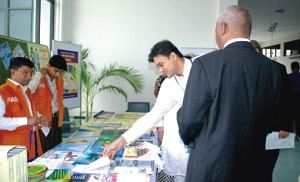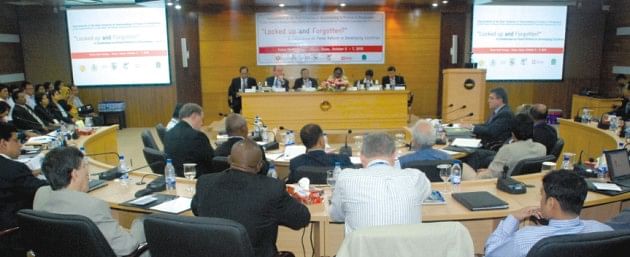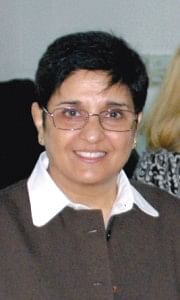|
Special Feature
Making Changes within the Walls
Tamanna Khan

Both the Law Minister and the Home Minister attended the seminar showing Bangladesh government’s genuine interest in prison reform.
Thirty-two year old Ashraf (not his real name), a CNG driver and one of the two bread earners of a seven-member family, was arrested on accusation of theft in 2007. The case was filed with Keraniganj Police Station and he was taken to the Kashempur Central Jail and forgotten.
People like Ashraf disappear into oblivion as our society considers an arrestee as a criminal whether proven guilty or not and justifies imprisonment as the only consequence. Furthermore, we expect released prisoners not to repeat crimes in fear of going back to the hell called prison. Bangladeshi prisons no doubt are mini hells where on average, 200 inmates are crammed into a 40 square metre space and in many cells people have to wait for their turn to sleep. Over the years, overcrowding has become so worse that the Prison Directorate openly admits that they are failing to meet the UN defined minimum standards of adequate light, air, decency and privacy in prison.
 |
Kiran Bedi sharing views with law and policy makers at the conference. |
So why should we be concerned of the ghastly situation inside the four walls of the prison? Even if we do not take human rights into consideration, we need to address the threat that the overcrowding conditions of the prisons of Bangladesh pose to this part of the wall. The prisons are breeding grounds of contagious diseases like pulmonary tuberculosis, HIV/ AIDs, and affected prisoners are likely to bring back their prison legacy into the society, when released. Moreover, the prisons are generating more crimes than repentance, as inmates of all age and classification whether children, mentally ill, addicts or murderers share the same space. The lack of rehabilitation and training programmes for prisoners also makes it difficult to reintegrate them into the society. Resources available are all used up to ensure food and security in the overcrowded prisons and thus proper reformatory steps remains a far-fetched dream.
The prison problem was actually identified in 1980 in the Bangladesh Jail Commission Report under the chairmanship of Justice Munim, where overcrowding was highlighted as a problem and alternative solutions rather than building new prisons were called for. Analysis of the problem showed that the crime rate has little to do with overcrowding rather it is the lack of legal advice and assistance to prisoners and the slow judicial system that keeps people inside bars for years without trial. Many inmates fall victim to a court practice called the “on call” situation, where prisoners end up with no foreseeable court date.
Ashraf has fallen victim to the “on call” situation. When the trial court announced a date for his case, they failed to inform him about the next date by issuing a production warrant to the prison authority. The production warrant never reached the Kashempur prison. When the case date arrived, the court noticed that Ashraf had failed to appear in court and thus recorded him as abscondee, whereas, oblivious to court order, Ashraf kept on waiting for the court to call him. This went on for three excruciating years.
 |
Foreign participants looking at the brochures and booklets of the paralegals of the three NGOs. |
Ashraf's story is only one among the hundred others who languish in prison without a trial; in fact 72 percent of inmates of Bangladesh are untried and therefore legally innocent. In most cases, these are poor people with no lawyers to defend them and with no idea about their legal rights. Even the Legal Aid Act 2000 enacted to help the poor and the vulnerable failed to reach the targeted people because of the flaws of the process and the ironically 75 percent of fund allocated annually for the purpose remains unutilised.
Under the circumstance, when German Technical Corporation (GTZ) approached the government to lend support to women who remain in prison for their “own protection”, the Bangladesh government requested for a larger support in solving the overcrowding problem in prison. Thus with GTZ's support, Bangladesh's Ministry of Home Affairs and Prison Directorate launched the project “Improvement of the Real Situation of Overcrowding in Prisons in Bangladesh” in 2008.
The project has piloted its work in three districts in Dhaka, Bogra and Madaripur where with the support of Building Resources Across Communities (BRAC), Bangladesh Legal Aid & Services Trust (BLAST) and Madaripur Legal Aid Association (MLAA), census of the population in three pilot prisons was carried out. The census helped identify the number of prisoners charged with petty crimes, the average time spent in custody pending trials, percentage of under-trials with bailable offenses, percentage who cannot afford bail and so on.
The next step was to reduce overcrowding by bringing out many of these unwanted prisoners by providing them assistance through the existing mechanism. “Bangladesh has a good criminal justice system and design; where the lacking is in the coordination of the three principal agencies that is court, prisons and police,” says Promita Sengupta, GTZ Programme Coordinator, Gender Governance and Rights. This coordination task has been assigned to paralegals who are not lawyers but Non-government Organisation (NGO) staff trained by police, court officers, prison authorities and the judiciary. They have access to prison that district legal aid committee lawyers lack and because of their training they can develop a common data set on the prisoners that are helpful to all the three principal agencies.

The Dhaka Declaration on reducing overcrowding in South Asian prison was drafted in the conference.
Every month the paralegals present information on prisoners who can be moved out of the prison to a Case Coordination Committee (CCC) headed by the district judge and the district commissioner and the jail superintendent as the member secretary. There are also representatives from the police, the ministry of social welfare and ministry of women's affairs, civil sergeant's office, public prosecutor's office, chief magistrate and the partner NGO with which the government is working in that particular district and lastly, a member of the community police forum of the area. The CCC looks at the information case by case and assigns task and responsibilities to the related agencies to move the case forward. Monthy reviews are made on the progress of the cases while the paralegals ensure continuous information flow among the agencies.
The actions of the paralegals in the Kashempur prison finally helped Ashraf appear before the court in person and prove that he was not an abscondee and since he had already spent three years in prison - the usual sentence imposed on cases of theft, his pleading for bail was granted. Now the paralegals are helping him to appear regularly before court and keep the trial moving.
However, expediting and smoothing the trial process alone cannot solve the overall overcrowding situation and ensure human rights in prisons. Much more needs to be done to slow down the inflow of prisoners to the prisons as well as ensuring their proper reintegration to the society. The Bangladesh government has however shown the responsibility to understand the problem and is the only developing nations that has stepped forward forming partnership with development organisations and non-government agencies to solve the crisis. Through the international conference “Locked up and Forgotten” held at the Police Staff College at Mirpur on October 6 and 7, the government and its partner NGOs aimed to share their experiences of prison reform with the international community, listen to the steps other countries have taken and later incorporate some of those in the present reform process and lastly take the lead in prison reform and develop a modern prison legislation in the South Asian region.
Bangladesh's government interest in the reform process has been demonstrated by the presence of the Home Minister and the Law Minister at the inaugural session and the legendary prison reformist Kiran Bedi. Bedi in her keynote speech shared the exemplary reforms she carried out at the notorious Tihar jail of India while working there as the Inspector General. She explained how through her 3-C corrective, collective and community- steps, she managed the 10,000 prisoners living in a prison with 3000 inmates capacity. After Kiran's speech papers on the current reform process in Bangladesh was presented by Promita Sengupta, prison legislation presented by Barrister Adam Stepleton, an international expert on penal reform and lastly Barrister Sara Hossain, a member of the advisory committee of the reform project in Bangladesh talked about the condition of legal aid and what else can be done.
Participants of the conference included lawyers, judges, NGO workers, paralegals, human rights activists, police, formal law ministers, academicians not only from Bangladesh but also from the South Asian Association for Regional Cooperation (SAARC) nations as well as from UK, Europe and Africa. They actively participated in group discussion dealing with best practices as regards to reducing overcrowding, providing legal help and finally developing comprehensive and modern prison legislations. The conference then drafted a Dhaka Declaration on reducing overcrowding in prisons in South Asia, through open debates and decided to forward the declaration to SAARC governments for review and developing an action plan. In Promita's word the conference gave Bangladesh the opportunity to demonstrate to other countries what is possible and what its future plans are.
KIRAN BEDI
The Reformist
With her, cropped hair and no-nonsense attitude Kiran Bedi portrays the true policeperson - honest, intelligent and dedicated to steer society. Born in Amritsar, India to unconventional parents, Bedi was brought up under Gandhian principles and encouraged to become self-reliant. A National and Asian Tennis Champion, Bedi joined the Indian Police Service in 1972, and through her 35 years of service that won her the Ramon Magsaysay Award in 1994, she has given a completely new meaning to policing. In an interview with the press this legendary police officer shared her secrets of successful and welfare policing.
 |
Kiran Bedi |
What is the magic behind being a good police officer?
I don't think there is magic. There is nothing but total commitment to do the right thing only and to be fearless and unselfishness. My life has been that of total commitment, total sacrifice and total integrity. If I take upon something then it is with total focus, total concentration, total commitment and fearlessness and being absolutely unselfish. These are the human values I grew up with and I am the result of these.
Tell us about the reforms you carried out in Tihar and did you face any problem in doing so?
I had no resources to turn things around and no budget for reforms because it was not on the agenda. I wanted to educate all 10,000 prisoners because that was vital for reforms. I had no books, no teachers, no blackboards, no stationary nothing. Then I reached out to the community outside. I sent an appeal to the Delhi schools saying I want to educate 10000 prisoners I need your used school books. I got thousands of schoolbooks everyday, thousand of school bags. I told the prisoners when your relatives visit you with food ask them to bring you two copies and two pencils- one for you and one for your friend whose relatives don't come. When all these things started to appear in the newspapers, many teachers approached me saying that can we come and teach voluntarily. I did a security check with them, gave them an identity card and allowed them inside. Then from my own prison system, I found out the number of educated prisoners and trained them to become teachers. In the carpentry unit I made my own blackboards. When I wanted storybooks I approached publishers outside to donate me the books they reject. This is how I had an educational programme for 10,000 prisoners at no cost to the government. Education is the root to reform.
I would supervise along with the staff by walking the entire prison everyday. Then the government of India stepped in by opening national open schools for examinations; Indira Gandhi National Open University came in, providing free education. In the evening we used to call learned teachers from different religions to come and speak to the prisoners as discourses developing communal harmony. Then we introduced exceedingly powerful meditation programmes, where prisoners would observe their own minds and do a breath watch. I did not spend any money; on the contrary, I converted garbage inside the prison into manure and sold those to earn money for the welfare fund.
Whatever I did was authorised by law. It was within the prison manual and the Prison Act. So why would somebody object. I may have received non-cooperation. Some may not have liked the reforms as it was appreciated and some people are not happy about other's appreciation.
Did you ever receive any pressure from seniors and politicians while carrying out your duty?
There were always mere pleading; never an order as they knew they were wrong. They knew it was no point telling her. When police officers develop the reputation of being truthful then the court and the public trusts you. Any human being who earns trust in his/her life is powerful, is a reformer a change agent. They never asked for an exception because of this image and reputation. You see politicians have their own way of working. Police officers or bureaucrats don't have to become politicians. One is an untrained leader and the other is trained by organisations to uphold the law. Politicians are self-trained not institutionally trained. Politicians do what suits them - for some it is the national interest for some self-interest whereas for a police officer or bureaucrat it has to be only national interest because that is the only training they are sworn to.
Tell us your observation of the prison reform in Bangladesh?
All I know is that you are making an effort to change. The GTZ team engaged with Bangladesh government has the brightest ideas. If you were not interested why would the home minister and the law minister attend the seminar together? I think they are serious, they want to change and they want to learn. Now the media and the civil society should see how well the decisions and resolutions arrived at the conference are implemented over the next one year.
Copyright
(R) thedailystar.net 2010
|

